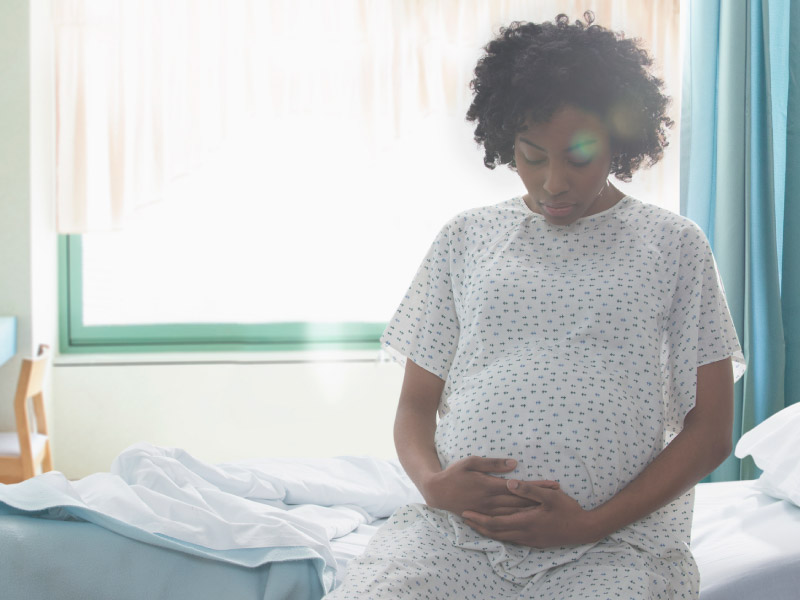Why Black women are less likely to survive pregnancy, and what's being done about it
By Maria Elena Fernandez, American Heart Association News

Being Black and pregnant in the U.S. was already a risky combination, and health experts now worry the pandemic is making things worse.
Before the pandemic, Black women were three times more likely than Hispanic women and 2.5 times more likely than white women to die from causes linked to pregnancy, according to the latest Centers for Disease Control and Prevention data from 2018. Those statistics suggest that for every 100,000 live births, 37 Black women died while pregnant or within six weeks of pregnancy compared to 12 Hispanic women and 15 white women.
Although data regarding the pandemic's impact on maternal mortality won't be available for some time, medical experts and health advocates are collecting anecdotes that highlight the intensifying crisis facing Black women.
"We haven't invested in the things that people need that protect them from harm when there isn't a pandemic, so we're confident that when we do get the data, it's going to show that the outcomes actually worsened because we don't have a social safety net," said Dr. Joia Adele Crear-Perry, an OB-GYN and founder and president of the National Birth Equity Collaborative.
"We haven't made any substantive changes when it comes to listening to patients more, making sure their needs are addressed, and having access to community support – the things we know actually save lives," she said.
Her organization works to reduce Black infant and maternal deaths through research, advocacy and racial equity and birth equity training.
For nearly a year, COVID-19 has overwhelmed local hospitals and stressed resources, depleted blood banks, and transferred some in-person medical visits to video calls. Early in the pandemic, some women were left without essential support when their companions were not allowed in birthing rooms because of pandemic restrictions.
But even before the COVID-19 crisis began, Black mothers reported being dismissed by medical professionals when they expressed concerns during childbirth. Tennis superstar Serena Williams told Vogue in 2018 that she could have died after a C-section when she recognized she had a blood clot in her lungs but had trouble persuading hospital staff to take her concerns seriously.
The reasons behind these racial disparities are multifaceted. Lack of access to health care and poor quality of care are among the factors. But even college-educated Black women die at higher rates from pregnancy-related causes than white women who didn't finish high school, CDC data show.
"For years, there has been implicit racial bias in American medicine," said Dr. Mary Rosser, director of Integrated Women's Health at Columbia University Irving Medical Center in New York City. "America has segregated people into neighborhoods where they don't have access to resources such as healthy food, green spaces, job opportunities, good housing and health care. This is compounded with the stress caused by structural racism which also impacts Black women's health."
For mothers of all backgrounds overall, cardiovascular-related conditions are the most common cause of death, according to statistics from the American Heart Association. Federal data show such causes include cardiomyopathy, stroke and other cardiovascular conditions. Other pregnancy-related deaths result from hemorrhage, infection and high blood pressure disorders such as preeclampsia.
"We're not biologically different; there's no Black gene or Black heart or Black kidneys," said Crear-Perry, who serves on the advisory board of Black Mamas Matter Alliance, a national network of more than two dozen maternal health initiatives and organizations led by Black women. "We've spent generations blaming Black people for their outcomes without really addressing the underlying root causes of racism, classism and gender oppression. So, when people ask me what is the cause for Black maternal death, the answer is not race. It's racism."
The federal government is paying attention to the issue. Last December, the U.S. Department of Health and Human Services outlined plans to fund health care providers serving the most high-risk women, develop and publicly report maternal health quality measures, and invest in maternal health research. In addition, the CDC last summer launched the Hear Her campaign to educate people about the warning signs of pregnancy complications.
For Black women specifically, the Association of Black Cardiologists last June convened a task force of clinicians, faith-based community leaders, research organizations and the media to pinpoint disparities in care and propose solutions. The group published a position paper Wednesday in the AHA journal Circulation: Cardiovascular Quality and Outcomes. It's the same week three members of Congress introduced legislation called the Black Maternal Health Momnibus Act of 2021 aimed at reducing ethnic and racial disparities.
"We know that if you have chronic stress and that stress is thrown at you on a constant everyday basis, you're going to have poor health outcomes," said Dr. Rachel Bond, the position paper's lead author.
By working with faith-based organizations and engaging businesses, like beauty salons, the task force hopes to reach women where they convene and talk openly, said Bond, a cardiologist at Dignity Health Medical Group Arizona. The goal is to mitigate some of the mistrust that exists in the Black community toward health care providers and educate women about the risk factors for pregnancy complications and how to advocate for themselves more effectively.
"We wanted to highlight the 'strong Black woman' phenomenon because it exists, it's real, and it's something that we as clinicians have to empathize with," she said. "We have to do a better job of screening for it, particularly during a pandemic when stress is extremely heightened. It may be a game changer in terms of helping to reduce these disparities that we're seeing."
If you have questions or comments about this story, please email [email protected].







